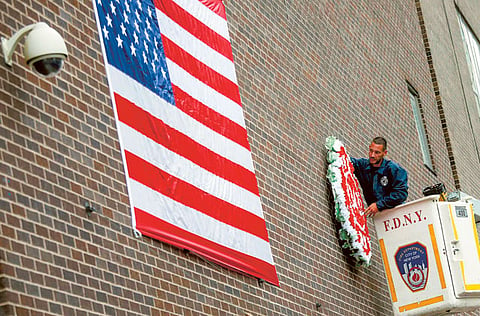World Trade Centre attacks: US still at war after 13 years
Despite declaring Al Qaida’s core decimated, US is waging battles on diverse battlefield

Washington: Thirteen years after Al Qaida militants hijacked and crashed four commercial airliners into the World Trade Centre towers in New York, the Pentagon near Washington and a field in Pennsylvania, the United States of America remains at war with an enemy that has expanded its global footprint.
US officials have declared core Al Qaida, based in Pakistan and Afghanistan, to be “decimated,” but the group and its affiliates are far from being on the verge of defeat.
“Al Qaida and its ideology of global jihad has proven to be a very resilient and adaptive enemy,” said Bruce Riedel, a former CIA officer who heads the Intelligence Project at the Brookings Institution in Washington. “The demise of Al Qaida has been proclaimed prematurely more than once. It is nowhere in sight today.”
US attention and air strikes are currently focused on the Islamic State of Iraq and the Levant (Isil), an Al Qaida affiliate that Al Qaida has disowned and declared to be too extreme.
In its quest to carve out a caliphate straddling Syria and Iraq, Isil is pursuing a brutal campaign that has included the beheading of two US journalists. Hundreds of Westerners, meanwhile, have flocked to join Isil’s ranks raising fears in the West that these battle-hardened militants will return to harm their homelands.
From fighting Al Qaida in Pakistan and Afghanistan, the US today is waging wars on multiple fronts against groups like Isil, Al Qaida in the Arabian Peninsula in Yemen, and Al Shabab in Somalia, that draw inspiration from Al Qaida founder Osama Bin Laden’s brand of jihad.
The US State Department’s annual terrorism report found that, over the past several years, a “more aggressive” set of Al Qaida affiliates and like-minded groups that pose a threat to the US have emerged.
The most immediate challenge to the US is the proliferation of militant sanctuaries across the Arab world due to the failure of the Arab spring, Riedel said.
“Iraq, Syria, Libya, Yemen and parts of Egypt have become terror bases for Al Qaida and related groups. The same could again happen in Afghanistan and Pakistan after Nato leaves. Add Nigeria, Somalia and Mali and it’s a huge and diverse battlefield, far beyond what was Al Qaida’s reach on 9/11,” Riedel said.
“The US homeland is better protected than ever, but still vulnerable,” he added.
Military operations against Al Qaida and defensive measures, such as enhanced security for commercial aviation, have rendered Al Qaida significantly less capable of attacking the US than it was on 9/11, said Paul Pillar, a non-resident senior fellow at Georgetown University’s Centre for Security Studies.
“The chance of lesser attacks in the homeland by small groups or individuals is still significant, however — a reflection of the inherent vulnerabilities of any modern society to that sort of thing,” added Pillar, who is a CIA veteran and former national intelligence officer for the Near East and South Asia.
The US responded to the attacks of September 11, 2001, by invading Afghanistan after the Taliban regime in Kabul refused to turn over Bin Laden, to whom it had provided shelter. Bin Laden was tracked down to his hideout in Abbottabad, Pakistan, and killed in a US commando raid almost 10 years later.
The US invasion of Iraq in 2003 led to the ouster of longtime ruler Saddam Hussain and eventual installation of a US-backed government headed by Nouri Al Maliki, a Shiite. The Al Maliki government’s marginalisation and persecution of Sunnis contributed to the expansion of Isil — a Sunni militant group — from neighbouring Syria into Iraq.
After withdrawing all US troops from Iraq in 2011, US President Barack Obama has been drawn into the fight against Isil over humanitarian concerns and the need to protect US interests. He has, however, ruled out deploying US combat troops inside Iraq.
While conducting air strikes on Isil, the Obama administration has focused its efforts on building an international coalition, which may include the United Arab Emirates, with the aim of expanding the military operation.
US officials and analysts say there is an important role to be played by Gulf states in the fight against Isil, which receives significant private donations from the Gulf.
“Probably the most significant help Gulf states can provide — besides taking a very strong public line against Isil — is to use whatever influence they have with Sunni elements within Iraq to get them to cease all cooperation with Isil and to work with Shiites and Kurds to defeat the group,” said Mr. Pillar.
Sign up for the Daily Briefing
Get the latest news and updates straight to your inbox



